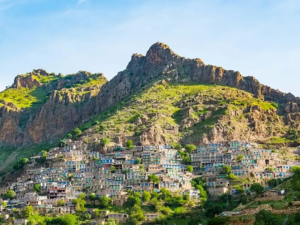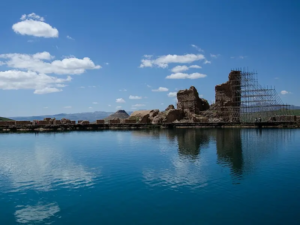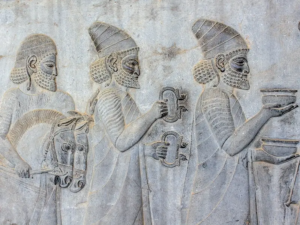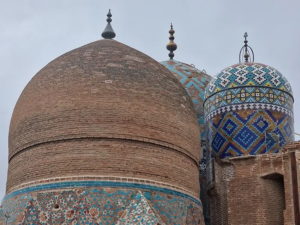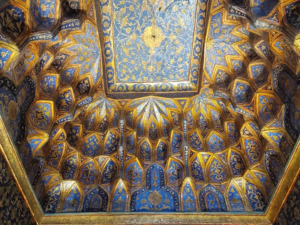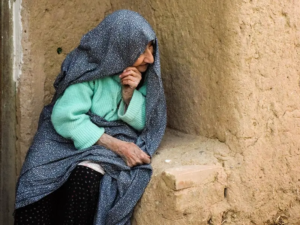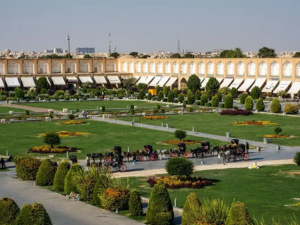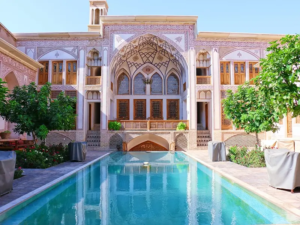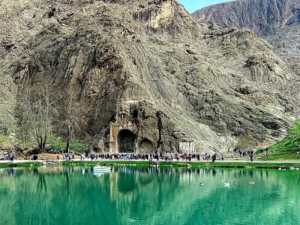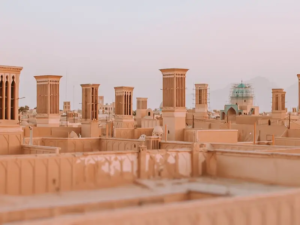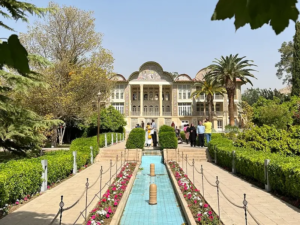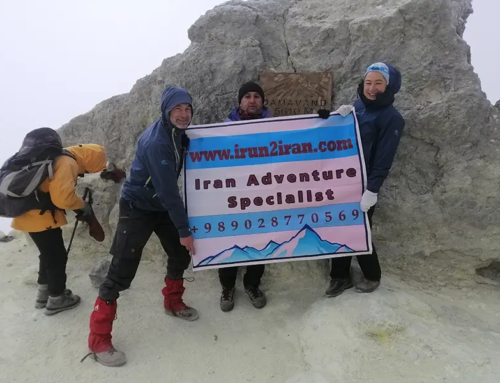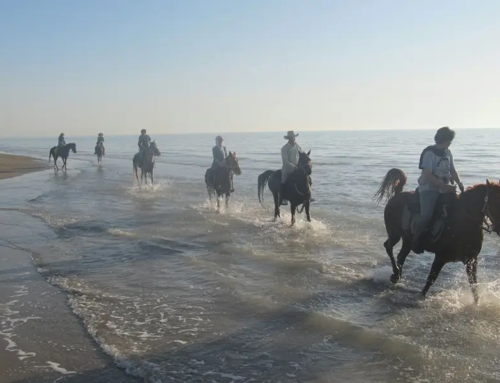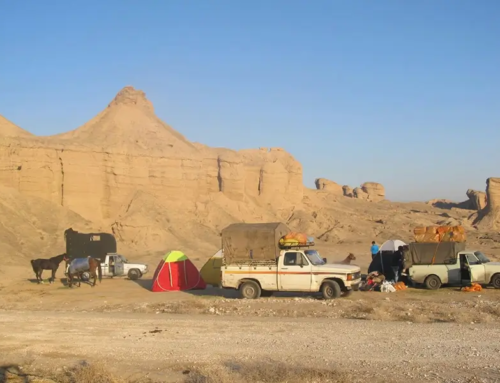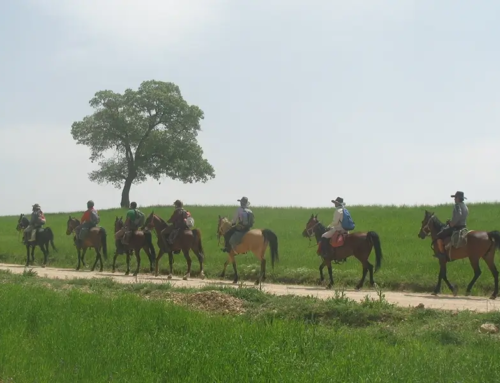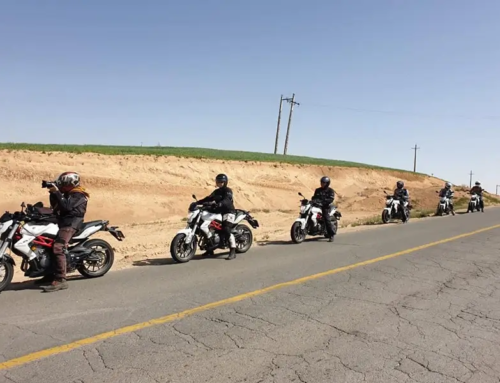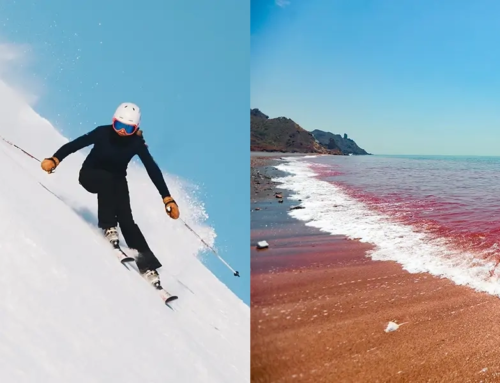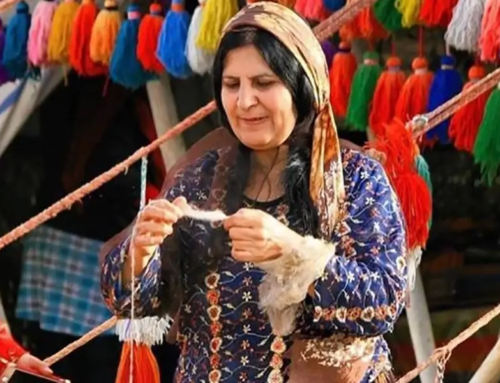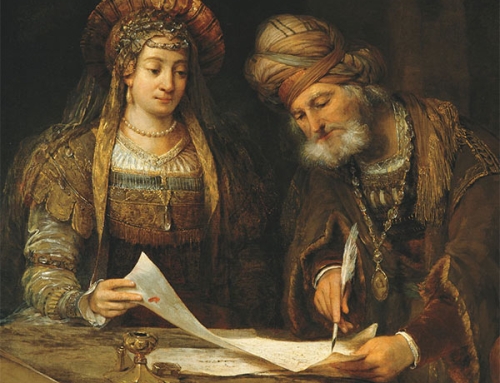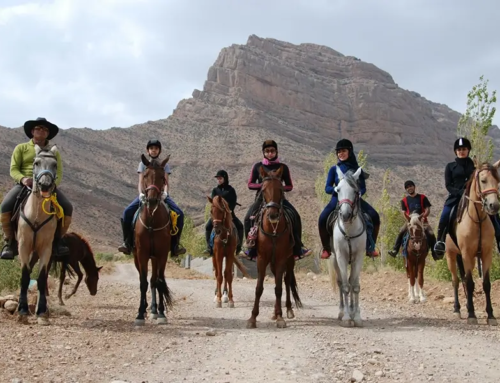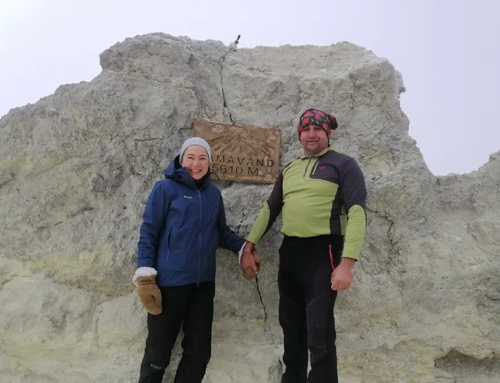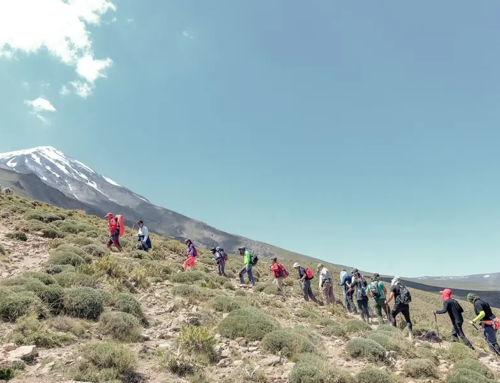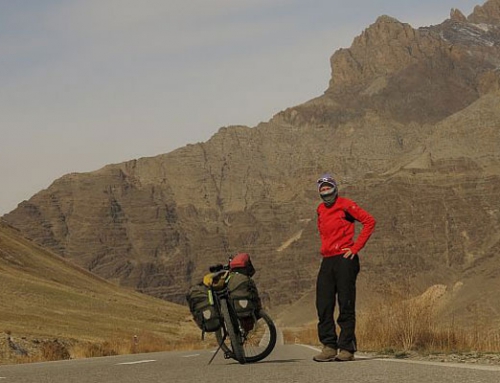Project Description
Iran World Heritage Tour
During this Iran World Heritage Tour you will embark on a journey to explore Iran’s rich UNESCO World Heritage sites. These sites, acknowledged by UNESCO as the common heritage of humankind, offer a glimpse into Iran’s fascinating history and culture.
On this tour, you will have the opportunity to visit a variety of iconic UNESCO world heritage sites in Iran, including the ruins of Persepolis, famous inscriptions of Bisotun, majestic Takht-e-Soleyan, vibrant Tabriz bazaar, and magnificent Naghsh-e Jahan Square. These sites, among others, showcase the architectural marvels and artistic achievements that have shaped Iran’s cultural legacy.
Join us on the Iran World Heritage Tour and embark on a remarkable adventure through Iran’s cultural treasures, where the past comes alive and the beauty of the country’s heritage unfolds before your eyes.
Detailed Itinerary
Day 1: Welcome to Iran – Tehran City Tour
![]() Arrive at IKA airport where our representative is waiting for you. Transfer to your hotel to rest until noon when your Tehran city tour starts. Today Tehran city tour includes visiting the Archeological (national) Museum. Thanks to the immense volume, diversity and quality of its monuments, this museum ranks as one of the few most significant museums in the world. Visit the UNESCO-recognized Golestan Palace, a masterpiece of the Qajar era that is a successful combination of Persian crafts and architecture with Western influences. The most characteristic features and ornaments date from the 19th century. After that explore Tehran Grand Bazaar.
Arrive at IKA airport where our representative is waiting for you. Transfer to your hotel to rest until noon when your Tehran city tour starts. Today Tehran city tour includes visiting the Archeological (national) Museum. Thanks to the immense volume, diversity and quality of its monuments, this museum ranks as one of the few most significant museums in the world. Visit the UNESCO-recognized Golestan Palace, a masterpiece of the Qajar era that is a successful combination of Persian crafts and architecture with Western influences. The most characteristic features and ornaments date from the 19th century. After that explore Tehran Grand Bazaar.
World Heritage Sites: Golestan Palace (2013)
Hotel: Razzaz Traditional Hotel, Tehran
Day 2: Visit Tehran. Drive to Zanjan.
![]() We’ll head for the north of Tehran where the Iranian upper-class lives to experience the local life in the cosy Tajrish Bazaar. Then, visit Sa’dabad Palace, the residence of Iran’s last Shah and go hiking along the mountain trail through Darband to visit the most beautiful scenery of Tehran from that top. Enjoy tea, Qalian water pipe and the delicious Persian traditional cuisine, Dizi.
We’ll head for the north of Tehran where the Iranian upper-class lives to experience the local life in the cosy Tajrish Bazaar. Then, visit Sa’dabad Palace, the residence of Iran’s last Shah and go hiking along the mountain trail through Darband to visit the most beautiful scenery of Tehran from that top. Enjoy tea, Qalian water pipe and the delicious Persian traditional cuisine, Dizi.
After lunch, we will head for Zanjan. Along the way, we will visit Soltaniyeh Dome an outstanding example of Persian architectural achievements. Being described as ‘anticipating the Taj Mahal’, Soltaniyeh is the earliest existing example of the double-shelled dome in Iran that still stands strong today.
Drive: 340km Tehran-Soltaniyeh-Zanjan
UNESCO World Heritage Sites: University of Tehran (tentative list), Soltaniyeh (2005)
Hotel: Dadaman Traditional Hotel, Zanjan
Day 3: Drive to Ardabil. Visit Ardabil.
![]() Ardabil is popular for its rich history, stunning natural beauty, and cultural attractions. The main aim of our today visit to Ardabil is the Sheikh Safi al-Din Khanegah and Shrine Ensemble, which is a UNESCO World Heritage Site. A place of spiritual retreat in the Sufi tradition was built between 16 to18 centuries. The route to the shrine of the Sheikh is divided into seven segments, which mirror the seven stages of Sufi mysticism, separated by eight gates, which represent the eight attitudes of Sufism. We will also pay a visit to the Historical bridges mostly built during the Safavid era. Saint Mary Armenian orthodox church and the ruins of Jame Mosque.
Ardabil is popular for its rich history, stunning natural beauty, and cultural attractions. The main aim of our today visit to Ardabil is the Sheikh Safi al-Din Khanegah and Shrine Ensemble, which is a UNESCO World Heritage Site. A place of spiritual retreat in the Sufi tradition was built between 16 to18 centuries. The route to the shrine of the Sheikh is divided into seven segments, which mirror the seven stages of Sufi mysticism, separated by eight gates, which represent the eight attitudes of Sufism. We will also pay a visit to the Historical bridges mostly built during the Safavid era. Saint Mary Armenian orthodox church and the ruins of Jame Mosque.
Drive: 260km Zanjan-Ardabil
World Heritage Sites: Sheikh Safi al-din Khānegāh and Shrine Ensemble in Ardabil (2010)
Hotel: Ideal Boutique Hotel, Ardabil
Day 4: Drive to Tabriz. Visit Tabriz.
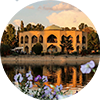 Tabriz has a rich history, many monuments in the city date back to the Ilkhanid, Safavid, and Qajar periods. In the 13th century, Tabriz was the capital city of the Safavid dynasty. We will visit the World Heritage Tabriz Bazaar, the largest covered traditional bazaar in the world, Kabood Mosque, Constitution House and Elgoli Park & Mansion.
Tabriz has a rich history, many monuments in the city date back to the Ilkhanid, Safavid, and Qajar periods. In the 13th century, Tabriz was the capital city of the Safavid dynasty. We will visit the World Heritage Tabriz Bazaar, the largest covered traditional bazaar in the world, Kabood Mosque, Constitution House and Elgoli Park & Mansion.
Drive: 220km Ardabil-Tabriz
World Heritage Sites: Tabriz Historic Bazaar Complex (2010)
Hotel: Orosi Boutique Hotel, Tabriz
Day 5: An excursion to the Armenian Monastic Ensembles of Iran.
![]() Today we will have an excursion to the Armenian Monastic Ensembles of Iran consists of three worship places of the Christian faith. These edifices dating back to the 7th century are examples of the outstanding universal value of the Armenian architectural and decorative traditions.
Today we will have an excursion to the Armenian Monastic Ensembles of Iran consists of three worship places of the Christian faith. These edifices dating back to the 7th century are examples of the outstanding universal value of the Armenian architectural and decorative traditions.
Drive: 510km Excursion to the Armenian Monastic Ensembles from Tabriz
World Heritage Sites: Armenian Monastic Ensembles of Iran (2008)
Hotel: Orosi Boutique Hotel, Tabriz
Day 6: Drive to Takht-e Soleyman. Visit Kandovan.
![]() Today we will start a long drive to another world heritage monument, Takht-e Soleyman. But first, we will visit the man-made cliff dwelling at Kandovan Village one hour far from Tabriz. The village is known for its unique architecture, as many of its homes are carved into cone-shaped rock formations.
Today we will start a long drive to another world heritage monument, Takht-e Soleyman. But first, we will visit the man-made cliff dwelling at Kandovan Village one hour far from Tabriz. The village is known for its unique architecture, as many of its homes are carved into cone-shaped rock formations.
Drive: 380km Tabriz-Kandovan-Takht-e Soleyman
UNESCO World Heritage Sites:
Hotel: Belgheis Ecolodge, Takht-e Soleyman
Day 7: Visit Takht-e Soleyman. Drive to Marivan.
![]() Takht-e Soleyman is believed to be a temple dedicated to the Zoroastrian deity Anahita during the Sassanid era, so it has strong symbolic and spiritual significance related to fire and water. It was designated as a UNESCO World Heritage Site in 2003. After visiting Takht-e Soleyman, we will head for Marivan and visit Karaftu Cave along the way. The 70 million-year-old Karaftu Cave is an impressive natural wonder located in the Zagros Mountains of western Iran. It is famous for its stunning rock formations, underground lakes, and intricate stalactites and stalagmites, which have been formed over millions of years by the natural processes of erosion and deposition.
Takht-e Soleyman is believed to be a temple dedicated to the Zoroastrian deity Anahita during the Sassanid era, so it has strong symbolic and spiritual significance related to fire and water. It was designated as a UNESCO World Heritage Site in 2003. After visiting Takht-e Soleyman, we will head for Marivan and visit Karaftu Cave along the way. The 70 million-year-old Karaftu Cave is an impressive natural wonder located in the Zagros Mountains of western Iran. It is famous for its stunning rock formations, underground lakes, and intricate stalactites and stalagmites, which have been formed over millions of years by the natural processes of erosion and deposition.
Drive: 270km Takht-e Soleyman-Karaftu-Marivan
World Heritage Sites: Takht-e Soleyman (2003), Karaftu Cave (tentative list)
Hotel: Zaribar, Marivan
Day 8: Drive to Kermanshah. Visit Uramanat.
![]() Have a morning visit to the crystal-clear Zarivar Lake surrounded by the stunning mountain scenery. Then we will head to Uraman to visit the outstanding vernacular architecture of this village. Uraman Takht is known for its distinctive multi-story stone houses that are built into the mountainside. The inscription of Uraman Takht on the World Heritage List recognizes the village’s unique architecture and traditional way of life preserved for centuries. We will explore the village’s narrow alleys and traditional houses, and learn about the local culture and way of life. Finally, we will drive to Kermanshah to stay overnight.
Have a morning visit to the crystal-clear Zarivar Lake surrounded by the stunning mountain scenery. Then we will head to Uraman to visit the outstanding vernacular architecture of this village. Uraman Takht is known for its distinctive multi-story stone houses that are built into the mountainside. The inscription of Uraman Takht on the World Heritage List recognizes the village’s unique architecture and traditional way of life preserved for centuries. We will explore the village’s narrow alleys and traditional houses, and learn about the local culture and way of life. Finally, we will drive to Kermanshah to stay overnight.
Drive: 280km Marivan-Uraman Takht-Kermanshah
World Heritage Sites: Cultural Landscape of Hawraman/Uramanat (2021)
Hotel: Kermanshah Botique Hotel, Kermanshah
Day 9: Visit Kermanshah. Drive to Shush.
![]() Kermanshah is a fascinating city that offers a unique blend of history, culture, and natural beauty. We will visit the UNESCO-inscribed Bisotun which features remains from prehistoric times to the Median, Achaemenid, Sassanian, and Ilkhanid periods. Taq-e Bostan rock reliefs and Kermanshah vibrant bazaar are the next highlights for today, then we will head for Shush.
Kermanshah is a fascinating city that offers a unique blend of history, culture, and natural beauty. We will visit the UNESCO-inscribed Bisotun which features remains from prehistoric times to the Median, Achaemenid, Sassanian, and Ilkhanid periods. Taq-e Bostan rock reliefs and Kermanshah vibrant bazaar are the next highlights for today, then we will head for Shush.
Drive: 400km Kermanshah-Shush
World Heritage Sites: Bisotun (2006), Taq-e Bostan (tentative list)
Hotel: Duruntash Hostel, Shush
Day 10: Visit Susa, Shushtar and Chogha Zanbil.
![]() The Khuzestan Plain has a long and rich history from around 2700 BC. Ancient civilizations like the Elamites and the Persian Empire played an important role in this area. Today, we will visit the Tomb of Daniel and Apadana Palace in Shush, also known as Susa, which was one of the most important cities of ancient Mesopotamia and has been continuously inhabited for over 5,000 years. Then we will drive to the impressive Ziggurat of Chogha Zanbil, the ancient temple built during the Elamite era, around 1250 BC, and is considered one of the best-preserved examples of a ziggurat in the world. Our last stop is at the Shushtar Historical Hydraulic System which is a UNESCO inscribed as a masterpiece of creative genius. Construction of this system can be traced back to Darius the Great in the 5th century B.C.
The Khuzestan Plain has a long and rich history from around 2700 BC. Ancient civilizations like the Elamites and the Persian Empire played an important role in this area. Today, we will visit the Tomb of Daniel and Apadana Palace in Shush, also known as Susa, which was one of the most important cities of ancient Mesopotamia and has been continuously inhabited for over 5,000 years. Then we will drive to the impressive Ziggurat of Chogha Zanbil, the ancient temple built during the Elamite era, around 1250 BC, and is considered one of the best-preserved examples of a ziggurat in the world. Our last stop is at the Shushtar Historical Hydraulic System which is a UNESCO inscribed as a masterpiece of creative genius. Construction of this system can be traced back to Darius the Great in the 5th century B.C.
Drive: 90km Shush-Chogha Zanbil-Shushtar
World Heritage Sites: Susa (2015), Tchogha Zanbil (1979), Shushtar Historical Hydraulic System (2009)
Hotel: Sarabi Traditional Hotel, Shushtar
Day 11: Drive to Bishapour.
![]() The Sassanid Archaeological Landscape of Fars Region is inscribed in 2018 including the archaeological sites and monuments from the Sassanid era (224-651 AD) in the ancient cities of Firouzabad, Bishapur and Sarvestan as World Heritage Sites. During the next few days, we will pay a visit to them.
The Sassanid Archaeological Landscape of Fars Region is inscribed in 2018 including the archaeological sites and monuments from the Sassanid era (224-651 AD) in the ancient cities of Firouzabad, Bishapur and Sarvestan as World Heritage Sites. During the next few days, we will pay a visit to them.
Let’s hit the road to Bishapour early in the morning. As a well-preserved city from the Sassanian era, Bishapour offers a unique glimpse into the past, allowing visitors to explore the ruins of ancient buildings.
Drive: 450km Shushtar-Bishapour
Iran World Heritage Sites: Sassanid Archaeological Landscape of Fars Region (2018)
Hotel: Moghadam Ecolodge, Bishapour
Day 12: Drive to Shiraz. Visit Firouzabad.
![]() Today we will drive to Firouzabad and finally to Shiraz. The ancient Firouzabad was founded by the Sassanid king Ardashir I in the 3rd century AD and served as the capital of the Sasanian Empire for a short period of time. Let’s visit the Castle of Ardeshir and Qal’eh Dokhtar and then drive to Shiraz. Rest and relax at the hotel for a few hours. In the evening, we will take part in a cooking class and enjoy Shirazi home-cooked meals and hospitality.
Today we will drive to Firouzabad and finally to Shiraz. The ancient Firouzabad was founded by the Sassanid king Ardashir I in the 3rd century AD and served as the capital of the Sasanian Empire for a short period of time. Let’s visit the Castle of Ardeshir and Qal’eh Dokhtar and then drive to Shiraz. Rest and relax at the hotel for a few hours. In the evening, we will take part in a cooking class and enjoy Shirazi home-cooked meals and hospitality.
Drive: 300km Bishapour-Firouzabad-Shiraz
World Heritage Sites: Sassanid Archaeological Landscape of Fars Region (2018)
Hotel: Karim Khan hotel, Shiraz
Day 13: Visit Shiraz.
![]() Shiraz, famous as the city of roses and nightingales, is the center of Persian culture and sophistication, gardens and poetry. Visit the highlights of Shiraz in a walking quarter including Karim Khan Citadel, Pars Museum, Vakil mosque, Vakil Bazaar, and Nasir Almolk Mosque. In the afternoon, visit other highlights in Shiraz such as the Tomb of Hafez, Ali Ibn Hamzah holy shrine, and Eram Garden. If time allows, we will visit an Iranian musical instrument workshop.
Shiraz, famous as the city of roses and nightingales, is the center of Persian culture and sophistication, gardens and poetry. Visit the highlights of Shiraz in a walking quarter including Karim Khan Citadel, Pars Museum, Vakil mosque, Vakil Bazaar, and Nasir Almolk Mosque. In the afternoon, visit other highlights in Shiraz such as the Tomb of Hafez, Ali Ibn Hamzah holy shrine, and Eram Garden. If time allows, we will visit an Iranian musical instrument workshop.
World Heritage Sites: The Persian Garden (2011)
Hotel: Karim Khan hotel, Shiraz
Day 14: An excursion to Persepolis and Pasargadae.
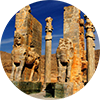 We will drive for 45 min to visit the great gem of ancient Persia, Persepolis. The magnificent ruins of Persepolis which lie at the foot of Mount Mehr was the capital of the Achaemenid Empire founded by Darius I in 518 B.C. Then, we will visit the Necropolis, the magnificent burial place of the Achaemenid kings. Seven bas-reliefs dating back to the Elamite and Sassanid periods are carved there as well. Finally, we will visit Pasargadae, the tomb of Cyrus the Great, the originator of the Achaemenian Empire (550 B.C.). His grave remaining from years ago besides his brave personality inspires all the visitors.
We will drive for 45 min to visit the great gem of ancient Persia, Persepolis. The magnificent ruins of Persepolis which lie at the foot of Mount Mehr was the capital of the Achaemenid Empire founded by Darius I in 518 B.C. Then, we will visit the Necropolis, the magnificent burial place of the Achaemenid kings. Seven bas-reliefs dating back to the Elamite and Sassanid periods are carved there as well. Finally, we will visit Pasargadae, the tomb of Cyrus the Great, the originator of the Achaemenian Empire (550 B.C.). His grave remaining from years ago besides his brave personality inspires all the visitors.
Drive: 290km Shiraz-Persepolis-Pasargadae-Shiraz
World Heritage Sites: Persepolis (1979), Necropolis (tentative list), Pasargadae (2004)
Hotel: Karim Khan hotel, Shiraz
Day 15: Drive to Kerman.
![]() We have a long drive from Shiraz to Kerman. Say farewell to the Sassanid Archaeological Landscape of the Fars Region by visiting the last palace in Sarvestan. The palace dates back to the 5th century AD and is one of the most important examples of Sassanid architecture in Iran. The palace is known for its unique architecture, which features a central courtyard surrounded by columns and arches.
We have a long drive from Shiraz to Kerman. Say farewell to the Sassanid Archaeological Landscape of the Fars Region by visiting the last palace in Sarvestan. The palace dates back to the 5th century AD and is one of the most important examples of Sassanid architecture in Iran. The palace is known for its unique architecture, which features a central courtyard surrounded by columns and arches.
Drive: 570km Shiraz- Kerman
World Heritage Sites: Sassanid Archaeological Landscape of Fars Region (2018)
Hotel: Khorram Traditional Hotel, Kerman
Day 16: Drive to Bam. Visit Mahan.
![]() After visiting the Ganjali Khan Complex, which is a historic monument from the Safavid era, we will hit the road to Mahan and Bam. Shahzadeh Garden in Mahan is a stunning Persian garden with beautiful fountains and pools. Then we will visit the Mausoleum of Shah Nematollah Vali, a 14th-century Sufi mystic and poet and drive to Bam. Bam Citadel dates back to the 6th century BC and was an important trading post on the ancient Silk Road.
After visiting the Ganjali Khan Complex, which is a historic monument from the Safavid era, we will hit the road to Mahan and Bam. Shahzadeh Garden in Mahan is a stunning Persian garden with beautiful fountains and pools. Then we will visit the Mausoleum of Shah Nematollah Vali, a 14th-century Sufi mystic and poet and drive to Bam. Bam Citadel dates back to the 6th century BC and was an important trading post on the ancient Silk Road.
Drive: 190km Kerman-Mahan-Bam
World Heritage Sites: The Persian Garden (2011), Bam and its Cultural Landscape (2004)
Hotel: Toranj Hostel, Bam
Day 17: Drive to Zabol. Visit Shahr-e Sukhteh.
![]() Shahr-e Sukhteh or the Burnt City, is an archaeological site located in the Sistan and Baluchistan province of Iran. It is one of the most important and well-preserved archaeological sites in Iran, dating back to the Bronze Age, around 3200-1800 BC. The site is famous for its well-preserved artifacts and architecture, including the remains of a citadel and a number of residential buildings. The site also contains evidence of advanced technologies, such as a complex water management system and early forms of metallurgy.
Shahr-e Sukhteh or the Burnt City, is an archaeological site located in the Sistan and Baluchistan province of Iran. It is one of the most important and well-preserved archaeological sites in Iran, dating back to the Bronze Age, around 3200-1800 BC. The site is famous for its well-preserved artifacts and architecture, including the remains of a citadel and a number of residential buildings. The site also contains evidence of advanced technologies, such as a complex water management system and early forms of metallurgy.
Drive: 510km Shahr-e Sukhteh-Zabol
World Heritage Sites: Shahr-i Sokhta (2014)
Hotel: Partian Hotel, Zabol
Day 18: Lut desert.
 Today we will cross the Lut desert or the Dasht-e Lut. This large desert is one of the hottest and driest places on Earth, with temperatures reaching up to 70°C (158°F). It was inscribed in 2016 for its outstanding universal value as an exceptional example of ongoing geological processes. Today we will visit its stunning landscapes, vast sand dunes, canyons, and unique rock formations called Kalut.
Today we will cross the Lut desert or the Dasht-e Lut. This large desert is one of the hottest and driest places on Earth, with temperatures reaching up to 70°C (158°F). It was inscribed in 2016 for its outstanding universal value as an exceptional example of ongoing geological processes. Today we will visit its stunning landscapes, vast sand dunes, canyons, and unique rock formations called Kalut.
Drive: 460km Zabol-Shahdad
World Heritage Sites: Lut Desert (2016)
Hotel: Shafi Abad Ecolodge, Shahdad
Day 19: Drive to Zeinoddin Caravanserai. Visit Meymand village.
![]() We will depart desert cities to other desert cities. En route, we will visit the troglodyte village of Maymand. The village is known for its unique cultural landscape, which has been shaped by the interaction between the local people and the natural environment over thousands of years.
We will depart desert cities to other desert cities. En route, we will visit the troglodyte village of Maymand. The village is known for its unique cultural landscape, which has been shaped by the interaction between the local people and the natural environment over thousands of years.
We will spend the night at Zeinoddin a UNESCO award winner Caravanserai dating back to the Safavid era. Spending a night there, conjure up the old style of Persian accommodation.
Drive: 440km Shahdad-Meymand-Zeinoddin
UNESCO World Heritage Sites: Cultural Landscape of Maymand (2015)
Hotel: Zeinoddin Caravanserai
Day 20: Visit Yazd.
![]() Yazd is the oldest adobe city that is juxtaposed with the central deserts of Iran. This ancient city which is decorated by stunning mosques is a combination of different religions. Visit the fire temple and Doulat Abad garden. Then explore the old city and visit the water museum, wind towers, Zarch Qanat, Amir Chakhmagh complex, Jameh Mosque which is crowned by the highest minarets in Iran and finally Zurkhaneh, the old Persian gym.
Yazd is the oldest adobe city that is juxtaposed with the central deserts of Iran. This ancient city which is decorated by stunning mosques is a combination of different religions. Visit the fire temple and Doulat Abad garden. Then explore the old city and visit the water museum, wind towers, Zarch Qanat, Amir Chakhmagh complex, Jameh Mosque which is crowned by the highest minarets in Iran and finally Zurkhaneh, the old Persian gym.
Drive: 70km Zeinoddin-Yazd
World Heritage Sites: Historic City of Yazd (2017), The Persian Garden (2011), The Persian Qanat (2016)
Hotel: Pars Traditional Hotel, Yazd
Day 21: Drive to Isfahan.
![]() The historic cities of Nain and Meybod on the way to Isfahan are the highlights of today. Both cities are known for their cultural heritage and traditional handicrafts. Meybod is famous for its pottery and ceramics while Nain is known for its textile and carpets production. Being historical both cities are home to a number of monuments, including the Jameh Mosque of Nain, the pre‐Islamic Narin Castle of Meybod, Caravanserai, Icehouse and Pigeon House.
The historic cities of Nain and Meybod on the way to Isfahan are the highlights of today. Both cities are known for their cultural heritage and traditional handicrafts. Meybod is famous for its pottery and ceramics while Nain is known for its textile and carpets production. Being historical both cities are home to a number of monuments, including the Jameh Mosque of Nain, the pre‐Islamic Narin Castle of Meybod, Caravanserai, Icehouse and Pigeon House.
Observing people is a fascinating part of any trip, and Zayandeh-Rood is one such place in Isfahan. The historical bridges are charming in the evening, when many young couples stroll and chat, and families take walks. (Due to the long-standing drought, Zayandeh-Rood may not have water during your visit.)
Drive: 320km Yazd-Meybod-Nain-Isfahan
World Heritage Sites: The Historical City of Maybod (tentative list)
Hotel: Pars, Yazd
Day 22: Visit Isfahan.
![]() Isfahan entitled “Half the World” is the legendary city of traditional Islamic archaeology and turquoise domes. Today we will visit the UNESCO-recognized Naqsh-e Jahan Square, the second huge square in the world after Beijing’s Tiananmen Square. Sheikh Lotfollah and Jameh Abbasi Mosques are brilliant masterpieces of Islamic-Persian architecture. Aliqapu, Chehel Sutoon and Hasht Behesht Palaces and finally Isfahan bazaar to purchase traditional arts & crafts.
Isfahan entitled “Half the World” is the legendary city of traditional Islamic archaeology and turquoise domes. Today we will visit the UNESCO-recognized Naqsh-e Jahan Square, the second huge square in the world after Beijing’s Tiananmen Square. Sheikh Lotfollah and Jameh Abbasi Mosques are brilliant masterpieces of Islamic-Persian architecture. Aliqapu, Chehel Sutoon and Hasht Behesht Palaces and finally Isfahan bazaar to purchase traditional arts & crafts.
Continue discovering other parts of Isfahan. Visit the Vank Church which is a typical example of the Christian churches of Armenia and the UNESCO-recognized Jameh mosque of Isfahan which is a gallery of the progress of Islamic architecture.
World Heritage Sites: Masjed-e Jāmé of Isfahan (2012), Meidan Emam, Esfahan (1979), The Persian Garden (2011)
Hotel: Sonati, Isfahan
Day 23: Drive to IKA airport. Visit Abyaneh and Kashan.
![]() Kashan which runs along the edge of the central deserts of Iran makes a contrast between the extent of the deserts and the greenery of an oasis. Archaeological discoveries in the Sialk Hills (7000 years) that lie 4 km west of Kashan reveal that this region was one of the primary centers of civilization in the pre-historic ages. Highlights of today are Tabatabaee or Boroujerdi historical houses, Sultan Mir Ahmad Hammam, Fin Garden, and Agha Bozorg Mosque.
Kashan which runs along the edge of the central deserts of Iran makes a contrast between the extent of the deserts and the greenery of an oasis. Archaeological discoveries in the Sialk Hills (7000 years) that lie 4 km west of Kashan reveal that this region was one of the primary centers of civilization in the pre-historic ages. Highlights of today are Tabatabaee or Boroujerdi historical houses, Sultan Mir Ahmad Hammam, Fin Garden, and Agha Bozorg Mosque.
The UNESCO-recognized village of Abyaneh is one of the oldest villages in Iran with houses harmonious with climate and mountains characterized by a peculiar reddish hue. This village preserved the old speaking, clothing and living style. A typical woman wears a white long scarf with colourful patterns and an under-knee skirt. Last but not least, we will head for IKA airport to take the departure flight.
Drive: 480km Isfahan-Abyaneh-Kashan-IKA airport
World Heritage Sites: Tape Sialk (tentative list), The Historical Village of Abyaneh (tentative list), Fin the Persian Garden (2011)
Hotel: Remis Airport Hotel, IKA Airport
Day 24: Depart Iran.
![]() Depert Iran with fond memories.
Depert Iran with fond memories.
2-8 Participants:
- Per Person: €1690
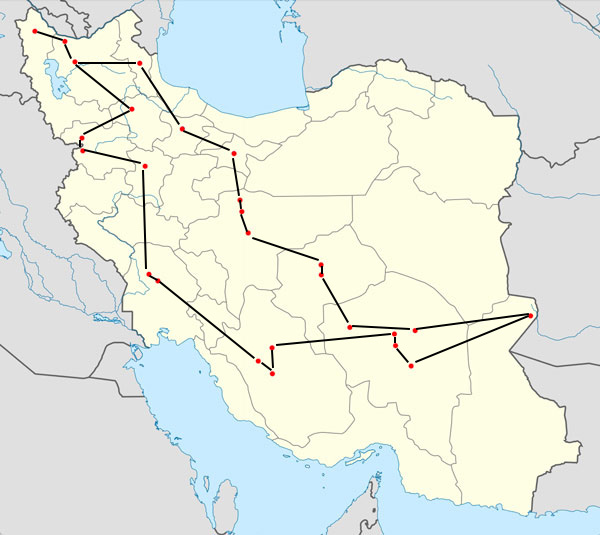
- Group Size: Min 2 – Max 8
- Departure: Upon Request
- Duration: 24 Days
- Style: Middle Class
- Best Time: All Year Round
- Route: Tehran, Zanjan, Ardabil, Tabriz, Jolfa, Kandovan, Takht-e Soleyman, Marivan, Uramanat, Kermanshah, Susa, Shushtar, Bishapour, Firouzabad, Shiraz, Kerman, Mahan, Bam, Zabol, Shahdad, Meymand, Zeinoddin Caravanserai, Yazd, Isfahan, Abyaneh, Kashan
- Accommodation: 23 nights dbl/twn at mentioned hotels or similar
- Meals: All breakfasts, 1 dinner with a local family
- Transport: Dedicated a/c vehicles
- Airport Transfers
- English speaking guide
- Invitation letter for Iran visa
- Bottled water, tea, and refreshments per day
- Best Price Guarantee
- No Prepayment
- Some FOC Services
- Get Discounts on Next Trips
Thanks for your help and for providing us with a great experience. All the best to you and your future endeavors and hope to make it back again to Iran someday.
I would have no hesitation in recommending your services to my friends, as I have said before, I really appreciated the way you answered emails promptly and professionally and made the entire experience easy and enjoyable.
I’m writing to tell you what an unbelievably enjoyable trip you arranged for me. Everything went perfectly. The accommodations were great, especially the quaint traditional guest houses.
Iran World Heritage Tour
During this Iran World Heritage Tour you will embark on a journey to explore Iran’s rich cultural heritage at its UNESCO World Heritage sites. These sites, including the ruins of Persepolis, acknowledged by UNESCO as the common heritage of humankind, offer a glimpse into Iran’s fascinating history and cultural legacy. Join us on the Iran World Heritage Tour!
Detailed Itinerary
2-8 Participants:
- Per Person: €1690

- Group Size: Min 2 – Max 8
- Departure: Upon Request
- Duration: 24 Days
- Style: Middle Class
- Best Time: All Year Round
- Route: Tehran, Zanjan, Ardabil, Tabriz, Jolfa, Kandovan, Takht-e Soleyman, Marivan, Uramanat, Kermanshah, Susa, Shushtar, Bishapour, Firouzabad, Shiraz, Kerman, Mahan, Bam, Zabol, Shahdad, Meymand, Zeinoddin Caravanserai, Yazd, Isfahan, Abyaneh, Kashan
- Accommodation: 23 nights dbl/twn at mentioned hotels or similar
- Meals: All breakfasts, 1 dinner with a local family
- Transport: Dedicated a/c vehicles
- Airport Transfers
- English speaking guide
- Invitation letter for Iran visa
- Bottled water, tea, and refreshments per day
- Domestic travel insurance
- Best Price Guarantee
- No Prepayment
- Some FOC Services
- Get Discounts on Next Trips
Thanks for your help and for providing us with a great experience. All the best to you and your future endeavors and hope to make it back again to Iran someday.
I would have no hesitation in recommending your services to my friends, as I have said before, I really appreciated the way you answered emails promptly and professionally and made the entire experience easy and enjoyable.
I’m writing to tell you what an unbelievably enjoyable trip you arranged for me. Everything went perfectly. The accommodations were great, especially the quaint traditional guest houses.
Iran World Heritage Tour Gallery
